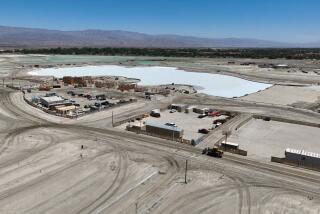Supervisors Correct to Sell Seized Land : * Rancho del Rio Can Dent a $13-Million Budget Deficit
The 213-acre Rancho del Rio site in Orange County, once owned by an alleged drug kingpin and now in the hands of the county government to dispose of, has received plenty of attention in the last few years.
Perhaps there was none to match the moment in 1989 when President Bush visited and used the seized site as a national symbol of the war on drugs. Bush said then: ŌĆ£Once a warehouse of death, now itŌĆÖs a source of hope. Rancho del Rio has been reclaimed.ŌĆØ
As of today, the ranch may have been reclaimed, as the President said, but its future remains somewhat in limbo.
On Dec. 18, the Board of Supervisors left Sheriff Brad Gates deeply disappointed when it decided to put the ranch, seized in a 1985 drug raid, up for sale. Gates had been lobbying to have the site turned into an enforcement training center for drug officers and had promised to pay for the proposal with private money and grants. But the supervisors were understandably skeptical when Gates said he had so far received no firm pledges of federal or state support for such a facility.
And at the same time, the supervisors were trying to grapple with the countyŌĆÖs enormous fiscal problems--specifically, a $13-million deficit in their midyear budget. Their decision to put the property on the market sometime late next month--especially in view of its attractiveness as a large, developable parcel in a county where big plots of land are hard to find--was fundamentally sound.
Despite the soft real estate market, there ought to be considerable interest in this particular parcel. Moreover, Gates will still have a shot at getting his training facility, because there is wide support for his idea in the business community, and a consortium of private buyers may be assembled to help him get his center.
The county has indicated its own receptivity to this proposal by suggesting that it did not vote no on a training facility at the site, only on the proposal to turn the property over to the sheriff.
But almost immediately in the initial speculation, there was talk that the countyŌĆÖs own Harbors, Beaches and Parks agency would submit a bid for the land. The stated goal of such a purchase would be to set the land aside for use as future open space.
The purchasing of open space is a good idea, but to do it the county would have to shift other park acquisition projects to the back burner. And, most important, if the county is trying to make up some of its budgetary shortfall by selling the ranch, why should the county then turn around and buy the land? ThatŌĆÖs voodoo economics at the county level.
Moreover, there are questions about the viability of such a purchase, deriving from uncertainty about whether a county agency could even bid for it. Under the terms of a Justice Department agreement, land must be used as a training facility if owned by the county.
Ronald S. Rubino, associate county administrative officer, has said that the bid would make sure ŌĆ£no-body low-balls the price.ŌĆØ
ItŌĆÖs understandable that the county would want to advance its position in the market. But the county is in the very fortunate position of having a highly desirable parcel of saleable land at a time when the real estate market is soft. This is a good chance to put a dent in the deficit.
If the county government wants to replenish its coffers in tight times, it really has no business being in the real estate market itself regarding this bidding for a ranch.
More to Read
Sign up for Essential California
The most important California stories and recommendations in your inbox every morning.
You may occasionally receive promotional content from the Los Angeles Times.










